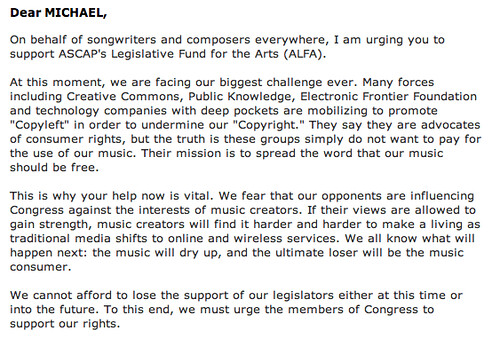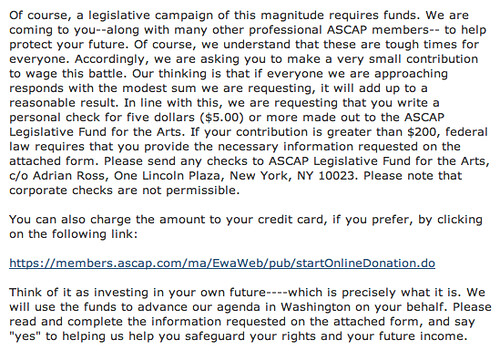ASCAP Members Pissed Off At ASCAP's Attack On Creative Commons
from the fundraising-for-whom? dept
Last week, we posted about how ASCAP was attacking EFF, Public Knowledge and (most bizarre of all) Creative Commons, as part of its fundraising drive. As we pointed out, this showed ASCAP's true colors. For an organization that presents itself as trying to supports artists' rights, it's downright ridiculous to attack a group like Creative Commons that only looks to give musicians more choices in what they do with their own rights. In following some of the reaction to the article, I saw a tweet from musician Eric Young, where he publicly declared plans to quit ASCAP over this fundraising appeal:#FUCKASCAP #iQuit ... this is the 1st public anncmnt of my resignation from ASCAP. this is bullshit.That left me wondering how other ASCAP members were feeling about this, and thankfully, Slashdot points us to a blog post on the Mind the Gap blog that discusses this issue (towards the end). In the comments, though, a number of ASCAP members express their displeasure with the organization.
Corey Dargel who also tweeted his displeasure and plans to quit ASCAP commented:
I think ASCAP should be ashamed of itself, and I am presently ashamed to be a card-carrying member of ASCAP. The language in that fundraising email is fear-based and reactionary. Furthermore, it is misleading and disingenuous. ASCAP portrays itself as a grassroots organization and calls attention to the "deep pockets" of Creative Commons, but in fact it is *ASCAP*, not Creative Commons, that's siding with corporate interests and "deep pockets."A Rich T. explains his problems with the ASCAP campaign:
I'm the agent for my father, who was a studio musician, performer, music & songwriter from the late 50's until the late 80's, when he retired.ASCAP member sarah is upset at the fear mongering:
We've been fighting with ASCAP for 6 years to get the money they received for selling the rights to several of his early recordings to a overseas company.
He also handed out free "right to record" statements at the end of each live show back when the recording industry was pushing the "taping is stealing" propaganda.
he's totally against anything that would further criminalize fair use, and has asked me to help him write up a appropriately scathing letter to ASCAP on the subject.
I got this letter yesterday; and all I could think was even if it was true, it wouldn't affect me -- seeing as how several songs I co-wrote have been airing regularly for over 2 years on TV (kid's show stuff, so I do mean regularly), yet I haven't seen a penny through ASCAP. I think they should worry about their own mission statement and get creators actually PAID.Musician Jeremy Jarratt also announced plans to quit ASCAP:
And if I was actually getting my royalties, I would still think the letter was ridiculous and fear-mongering. But what else are they going to do -- let everyone know there's an issue that people need to thoughtfully and sensibly make up their own minds on? Of course not.
I'm a card-carrying member of ASCAP as well. At least, i was until i got their message. I'm disaffiliating myself as soon as i can figure out how. This is ingenuous at best, and an insult to anyone with even the remotest modicum of understanding of modern digital content distribution. It shows only how antiquated this whole entire game is.Someone going by the name Bobkat who is a member of ASCAP admits that he generally likes ASCAP protecting his rights, but is disgusted with the tone of the letter and now very conflicted over how he feels about ASCAP:
ASCAP should change their moniker to ASSHAT: American Society of Socially-Harmful Attorneys and Treasurers.
I'm also a member of ASCAP, and I was digusted by the tone of the letter. I hold Creative Commons and the EFF in high regard, and painting them as some kind of enemy of musicians is ridiculous. As a musician, I don't feel like a small-time individual has many options; I have a pretty broad idea of fair use, myself, but if Kanye sampled my song and made millions off of it then damn right I would want a piece. Without the resources to hire a lawyer, who else but ASCAP could help me get my share? Yet at the same time, I don't completely trust that they're really always protecting my best interests; and in this case I believe they have amply demonstrated how clumsy and old-fashioned their philosophy is. What a crummy situation.Similarly conflicted is Dennis Bathory-Kitsz who wrote a very long comment trying to explain both sides, but finally coming down on the side where he hopes ASCAP changes its stance (this one was long, so just some excerpts here):
I'm a longtime member of both ASCAP and EFF, and I find the whole situation painful.Meanwhile, there were some similar comments found on the BoingBoing article on ASCAP's letter as well. For example, there is this comment from the musician Kemmler who posted the email he sent back upon getting ASCAP's fundraising pitch:
ASCAP's broadcast and international royalty collections are poor (former is a lottery, latter is unenthusiastic) but their domestic performance royalties are good and appropriately scaled. I appreciate that, and also appreciate that their staff is actually fairly small.
That said, I have to say I'm always disappointed by ASCAP's rough behavior (even if they're not nearly as awful as the RIAA). Maybe it's a negotiating stance, but it just tastes bad....
....
I attended one of the first ASCAP committee meetings about internet music use back in 1995 (where I met folks such as Laurie Spiegel and Morton Subotnik for the first time). I suspect that the composers in attendance 15 years ago are disappointed if not disgusted by the bullying position ASCAP has been taking (revealed as much in the "Daily Briefing" emails they send out as in the recent letter).
So I hope ASCAP will rethink its position and arrive at a truly creative solution that acknowledges how culture (to which they're nominally allied) functions as opposed to a hard-line interpretation of the law. This is no easy task, as Congress has been doing the bidding of the real deep pockets in the past few decades.
Dear Mr. Williams -Similar to some of the conflicted artists above, someone going by the name "BrooklynTwang" who appears to be the musician Rench posted a comment about how he supports ASCAP and what it does, but hates this fundraising campaign:
I'm not interested in supporting any initiative based on this sort of information-free screed. I've personally relied on creative-commons licensed materials to use in my own work, as well as a license which provides a convenient way to both promote and control the dissemination of my own work.
I also have a firm respect for the EFF and their efforts in protecting the interests of consumers and small business where they pertain to new media channels, the internet, or IP.
As a musician, and as an entrepreneur making my living selling equipment to studios and musicians, I obviously have a great deal to lose if the putative forces of "copyleft" somehow succeed in preventing music being paid for. However, I cannot condone, or fail to decry the practice of vilifying institutions like Creative Commons, which poses absolutely no conceivable illegitimate threat to ASCAP or its members.
If someone wants to license their materials under a CC license - that's their right. If someone wants to use CC-licensed material, and not pay ASCAP for some other material - that's also their right. Please grow up and get a grip.
I am an ASCAP member. I hate this fundraising letter and I am telling them so.That's not all either, but a quick sampling. I'm sure that this won't have a noticeable impact on ASCAP, which has 380,000 members, most of whom probably don't know or don't care much about the details of what it is ASCAP is misleadingly attacking. But ASCAP might want to be careful before continuing to attack organizations that actually do have musicians' best interests in mind. They might find that more and more will start to question ASCAP's motives as well. In the end, I doubt there was anything malicious in ASCAP's fundraising letter. It's just that the organization is so far out of touch with what's happening in the music world today that it actually thinks attacking these groups makes sense.
You can tell them too, right here
http://www.ascap.com/legislation/legislation-form.html
Just FYI though regarding the ASCAP-is-corporate-assholes talk, I am not a rich rockstar but I make money licensing music for film, tv, and commercials. I am happy to give music away free to the public, but if some corporation is going to use it to sell crap, they should pay me. Not just the up front fee, but royalties for each time they run the ad/show/film. ASCAP makes them do that so they don't get away with shortchanging artists like me. Thats one thing that ASCAP does, and thats why I am a member. ASCAP is not just another corporation. They are a player in a complex position between artists and corporations. They are not the bad guys, they are just not as good as they should be these days. Next time we vote on the ASCAP board members I will grill the nominees about this.
Filed Under: copyright, music
Companies: ascap, creative commons, eff, public knowledge



